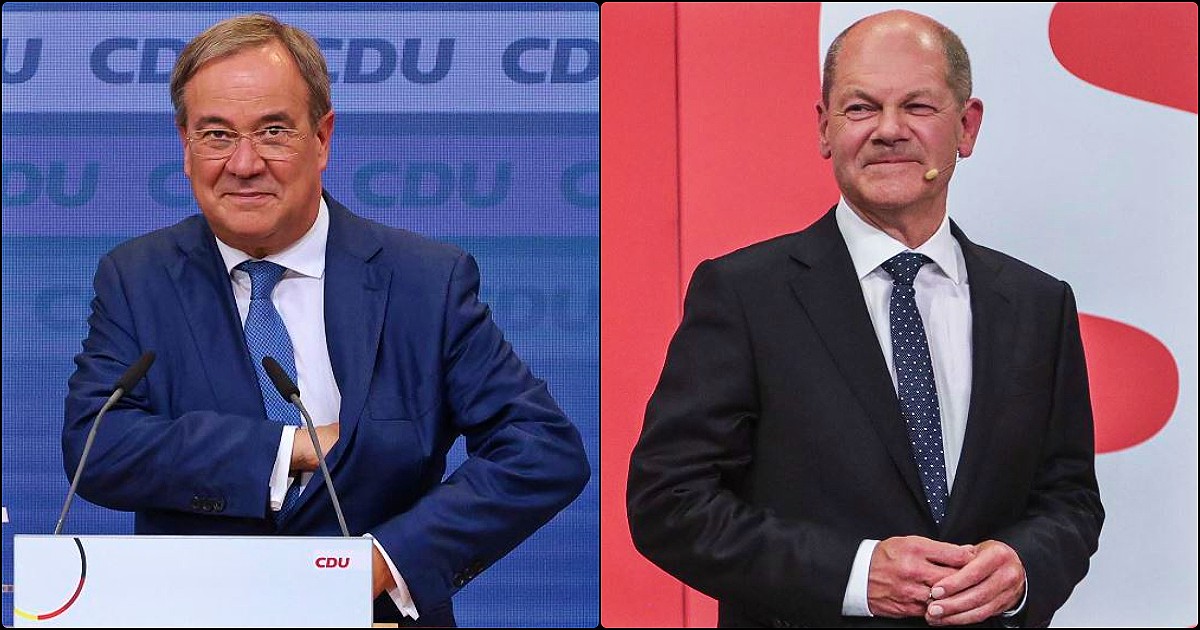I social democrats resurrect after the blow of 2017 and are the first party in front of the conservatives, which collect the worst result in their history, but both formations claim the stationery and therefore the task of trying to build one coalition. The German elections that mark the end of the era of Angela Merkel confirm that the Germany And a crossroads: can go to a government led by the Spd and by Olaf Scholz or to an executive with chancellor the candidate of the CDU Armin Laschet. Both took part in the post-election televised debate Berlin round and have expressed the will to get to have a new government before Christmas, saying he is confident that Merkel will not have to hold a New Year’s speech as chancellor. Scholz and Laschet, however, are well aware that the negotiations they will be long and complex: gave and liberals of the Fdp, respectively third and fourth parties, become the true balance needle to understand what face the next Berlin government will have. Indeed, without their seats, it will be impossible to have a majority.
It is the consequence of the result that emerged from the polls: the SPD is ahead with the 26% and the CDU-CSU follows closely, but al 24,2%. The Greens are al 14,3%, the liberals (Fdp) to11,5, l’AfD all’10,6, the Linke is nailed to the 5%, the minimum percentage that allows you to enter the Bundestag (but the definitive result will be needed for certainty). The numbers say that two solutions are possible: the Spd e i gave in government together with the liberals (the coalition “stoplight“), Or the more conservative and rigorist axis (CDU-liberals) allied with the Greens in the so-called Jamaica coalition. The other hypothesis is yet another re-edition of the Big coalition, but for now it has been excluded from both.
The Social Democrats have a minimal advantage over the Union, but the mood is opposite for Spd e Cdu. The Conservatives, lost Angela Merkel, they get the worst result of their history: the symbol of defeat is the conquest by the Social Democrat Anna Kassautzki of the college of Rugen-Greifswald where Merkel herself was elected from 1990 onwards. “Non we are satisfied“, Laschet had to admit when he spoke, after thanking the chancellor – who was at his side – for the 16 years of government of the country. Opposite climate among the Social Democrats: “I am happy with the result,” said Scholz. “AND clear that citizens want a change and that the next chancellor is called Olaf Scholz“, He clarified. The euphoria is palpable for a party that hasn’t won the elections since 2002. The Social Democrats claim the chancellor, also strengthened by the result of the Greens, who did not break through but confirm the third force of the country. A result “fantastic“Said the candidate Annalena Baerbock. “We have a mandate for the future,” he added, stating that Germany needs a “government of the weather“. An executive that the Greens would like to form together with the SPD, as the secretary reiterated Michael Kellner.
But Laschet, while admitting a negative result, claimed the possibility that “we can create a government under the leadership of the Union “. “Germany now needs one coalition for the future that it can modernize the country, a coalition for greater resilience, ”he said from the stage. The CDU wants to remain in the government and its secretary Paul Ziemak immediately re-launched the hypothesis of one Jamaica coalition which excludes the Social Democrats: “There is the possibility of a future alliance with gave e free“. Also Markus Soeder, leader of the Bavarians of the CSU, said he was convinced of “a Jamaican coalition”, explaining that the CSU is open to these talks together with the CDU: “We want to start these talks with the clear goal to define a leadership mandate for the Union, so that Laschet can become chancellor of Germany “.
“The Fdp has obtained one of the best results of its history ”, commented the party leader Christian Lindner. I free are the other force that will be courted by SPD and CDU: during the televised debate, Lindner stressed that in his opinion the Fdp and Verdi should talk to each other the formation of a new government in Germany before exploratory talks by the conservative CDU / CSU bloc and the SPD begin. The preference of liberals goes towards i conservatives, but Scholz immediately remarked the willingness to dialogue: the SPD has more in common with the Greens in the perspective of the next government coalition in Germany, but “my desire is to be constructive”, he told the Berlin round. Later also the co-president of the Greens Robert Habeck opened a all the coalition options. “We want to govern,” he said.
The German left The left – who in the last phase of the electoral campaign had also hoped to be able to enter a government with the SPD and the Greens – does not hide the disappointment for the electoral result: “The numbers speak a very clear language, it is a disappointing evening for us, ”the co-leader said Dietmar Bartsch. “We have to ask ourselves some questions,” he added. Those who have remained in the corner in this election campaign are theGerman ultra-right: the trend it gave Alternative for Germany growing in recent years has visibly braked. But for the AfD’s top candidate, Tino Chrupalla, the one that came out of the polls is in any case “a solid result”. The certainty, however, regardless of what the composition of the next coalition will be, is that the far right will no longer be the first force from opposition in Parliament.
